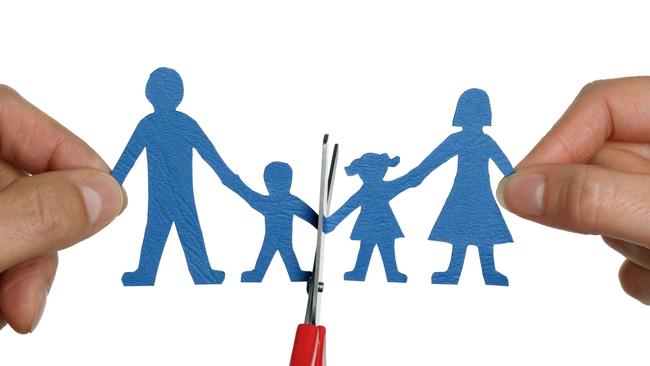Family law change will leave Dad back out in cold
The federal government is getting rid of shared parental responsibility following divorce. This is an ideological move and it will really affect people on the ground.

Why? Dreyfus is a big spruiker for transparency in the law, yet his government is responsible for sneaking through the most devastating amendments to the Family Law Act that cancel its most important objective: the presumption of equal shared parental care and responsibility.
Family law has possibly the most far-reaching effects on ordinary families caught up in the trauma of separation and divorce, yet the government is getting rid of shared parental responsibility embedded in Howard era reforms in 2006 that really affect people on the ground. This will cause even more trauma, frustration and violence, but Dreyfus seems impervious to argument or the research.
The Australian Institute of Family Studies showed, contrary to the ultra-feminists who never wanted shared parenting, the 2006 act was working and popular. It was passed with the support of both sides after one of the longest inquiries in Australian history.
Shared care and responsibility did not always meant equal time. This sometimes caused confusion and delay in settlements for parenting orders. So, the original Australian Law Reform Commission recommendations were to make the wording of the act clearer and simpler. However, simplicity in this case is a clever excuse to get rid of something that is intrinsic to the spirit of family law. Ironically, the way this simplicity is to be achieved is not simple at all. It is by information overload.
The new amendments have twisted the wording of the act so the two main areas of emphasis are child safety and the rights of the child. The rights of both parents to shared care have been surpassed by these two principles.
No one in their right mind would want a child to be placed in an unsafe situation, so the safety of children was assumed to be part of the original intent. Nor would one want children to be deprived of their rights. But two things became clear during committee hearings.
First, the way these new amendments have decided about the rights of the child is by citing the UN Convention on the Rights of the Child. But as Cash emphasised, it is highly unlikely that average parents, with no legal representation or training, would know anything about the more than 50 points in the UN convention – so much for simplicity. As Pauline Hanson said, by taking away the presumption of shared parenting, even in a presumably safe environment, the government is undermining the rights of the child by adversely affecting that child’s wellbeing. So, under the guise of making the act simpler, the government has redrawn it to remove its most important overriding principle.
Nevertheless, those opposing the government’s aim of ridding the act of its main object were not intransigent. Cash proposed amendments. She wanted the word meaningful to be inserted before the mention of a relationship as a factor in determining the best interests of the child, which would apply to the non-custodial parent and grandparents and others important to the child’s upbringing.
More important, she wanted a redraft of the presumption of equal shared parental responsibility, as recommended by the ALRC, to presumption of “joint decision-making about major long-term issues” when making parenting orders. She claims this would have retained the essence of shared parenting but removed the confusion that exists with current drafting.
So why is the government against equal parenting? Feminist campaigners in cahoots with the far left and the Greens have always been against the 2006 reforms because they appear to be more favourable to fathers. That ideology has triumphed under the Labor government. The spectre of domestic violence has always been the most useful weapon in this fight, even though few cases before the Family Court involve violence and, according to the Australian Bureau of Statistics personal safety surveys, the true rates of intimate partner violence against women have dropped from 2.3 per cent in 2016 to 1.5 per cent in 2021-22.
Hypocrisy is a strong term, and Cash might well have had the charge thrown back at her because in the end she voted for the bill. Unfortunately as opposition legal affairs spokeswoman it seems Cash needs to keep in with the feminist lobby and the female lawyers who praised the family law amendments, which “refocuses Australia’s family law system on the best interests of children and the safety of caregivers”. Never mind about deleting the presumption of shared parenting. Presumably shared parenting is not in the child’s best interests.
The 2006 family law reforms did not mean only one party could or should have pre-eminence in decision-making about children. But by eliminating the overarching presumption of shared care and responsibility in the law, that is what the outcome will be. The situation in most contested separations will revert to the old bad system of mothers having full parental rights and fathers once again left out in the cold.







It is not often in federal parliament that you hear the term hypocrisy being used to describe the actions of the highest-ranking law officer in the country. But this week that is precisely how senator Michaelia Cash described the actions of Attorney-General Mark Dreyfus.